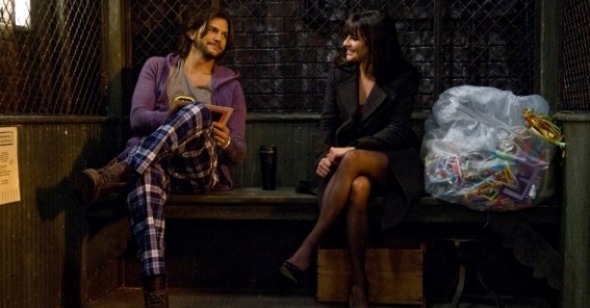Monday Hangover:
New Year’s Eve
by Justin Stewart and Michael Koresky
It’s an opinion so common that it even comes out of Ashton Kutcher’s mouth in Garry Marshall’s latest confection, but I hate New Year’s Eve. I hate it for the old reason that it’s drinking amateur hour, a parade of lightweights blowing noisemakers and shedding confetti. Just like every day should be Earth Day, you shouldn’t need an excuse to make merry, reflect on recent events, and make life-benefiting resolutions, and the obligatory, almost enforced nature of the “fun” on this holiday spoils it for me. The aspect I hate most is the televised Times Square ball drop, a pointless ceremony that a surprising number of people feel they cannot miss. (I was once tossed into and dislodged a panel of a cheap dividing wall when I jerkishly tried to prevent a friend from rushing to watch it.)
In this follow-up to Marshall’s similar ensemble romcom from 2010, Valentine’s Day, a bedridden Robert De Niro’s dying wish, croaked out of the side of his mouth in the manner of his Flawless stroke victim, is to be allowed onto the roof of his New York City hospital so he can see that precious ball drop one last time. What’s shocking is that this isn’t even the worst thread in a movie filled with numerous plots and sub-stories. Stiff competition: Party-loving bike messenger Zac Efron helping repressed office worker Michelle Pfeiffer check items off her resolutions list from last year (“Walk in all five boroughs in one day”; “Be amazed”!); Jessica Biel and Seth Meyers trying to have the first baby after midnight to win the hospital’s $25K prize (effeminate orderly: “May the best va-jay-jay win!”); and Kutcher’s scruffy hipster stuck in the elevator of his funky loft with Lea Michele, a straight-arrow backup singer he couldn’t possibly have anything in common with. But the worst by default is anything involving famous singer Jensen, because he’s played by the repellent Jon Bon Jovi—in pre-aged, black, acid-washed jeans.
It’s a lot like 2009’s New York, I Love You in its Grand Hotel menagerie of stars (it’s almost impressive how many unlikable ones are assembled here—James Belushi? Larry Miller?) and generic representation of the city. Mayor Bloomberg, who seemingly welcomes any and all film productions to shut down midtown blocks for a few hours every other week, even makes a smarmy cameo. The first images are the same speedy helicopter shots of the Brooklyn Bridge and Lady Liberty you’ve seen ten thousand times. Marshall’s orchestration of this mess is far from graceful, but I blame writer Katherine Fugate for New Year’s Eve—everyone’s a stereotype, there’s some weird racist dialogue about “Latin men,” and she’s shameless enough to give Hilary Swank a cathartic crying scene. That there are “more celebrities than rehab” (per Katherine Heigl’s character explaining the crowd attending Jensen’s New Year’s Eve event) is scant compensation. This is the movie the holiday deserves. —JS
Maybe the latest all-stars-slumfest from that master of mawkery and mirth Marshall has a shred of self-awareness: it opens with Michelle Pfeiffer literally falling into a pile of garbage. Sure, she picks herself up and dusts herself off, but the smell never quite leaves for the rest of the film. For a once bright and shining star, this must have been mortifying, and indeed Pfeiffer looks genuinely repulsed to be on set from beginning to end. For whipper-snappers like Zac Efron, however, New Year’s Eve really is a chance to get raucous: as a bouncy young messenger stud, he buzzes around trash-stenched Pfeiffer like a fly, with an enthusiasm that seems to border on pathological. There might have been some kick to their May-December meet-cute, if the actress could have mustered even one-one-hundredth of Zac’s desperate energy.
And desperation is the name of the game: New Year’s Eve mostly seems like a battle royale between excitable new stars who have yet to lose their twinkle (Efron; Abigail Breslin, desperate to kiss a boy for the first time; Lea Michele, desperate to belt out a tune in Times Square as a backup singer to that Bon Jovi jackass Jensen; Sofia Vergara, desperate to get dirty with Jensen but even more desperate to confirm herself as the Charo of the new millennium—her every line is a variation on “Ay, caramba!”) and a bunch of seasoned Oscar nominees and winners whose eyes have already glazed over (Pfeiffer, Robert De Niro, Halle Berry, Hilary Swank—all desperate for a paycheck). The result at least keeps you on your toes, flipping back and forth between lethargic earnestness (Swank’s midfilm, supposedly rousing speech about the meaning of New Year’s Eve) and bouncy pseudo-slapstick (that birthing contest bit sure is a race to the bottom), leaving you so unbalanced that a climactic fairy tale rendezvous doesn’t even seem particularly out of place. (When will Sarah Jessica Parker tire of running around the five boroughs in shimmering gowns? Probably the day a Matthew Broderick cameo won’t have a funereal effect on an audience.)
All in all, New Year’s Eve is undoubtedly lowest-common-denominator junk, but I’ll take Marshall and Fugate’s naïve, sitcom view of New York City as a fantastical wonderland of hopes, dreams, and incredibly annoying people over Shame director Steve McQueen’s chastising outsider’s view of the city as a soulless Gomorrah populated by abusive sex addicts and nosy waiters. That said, you’re right about the amount of remarkably unlikable actors (you forgot Swank, Heigl, and the charmless Josh Duhamel on that list) and the racism—there’s something vaguely sick about New Year’s Eve’s parade of straight, white people falling in and out of love and lust while all of the film’s black and Hispanic supporting characters exist only to encourage their romances (Chris “Ludacris” Bridges as a kindly cop), help them shake off their mortal coil (Berry as De Niro’s angelic nurse), or shimmy their ta-tas and throw tomatoes (Vergara). For diversity’s sake, I really want Marshall to do Yom Kippur next. —MK
